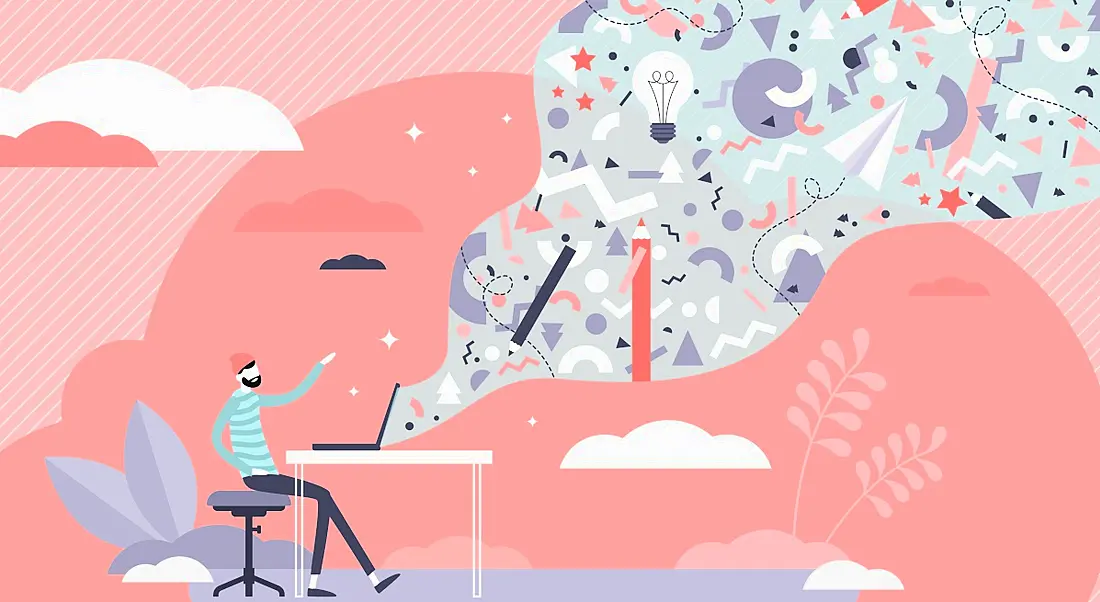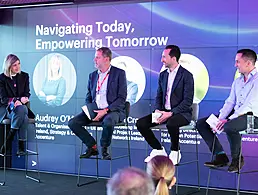AI is not a replacement for human creativity, but a tool that can help it reach its full potential – particularly for start-up founders, says Heather MacKinnon of US fintech Mercury.
Lots of people worry that AI is going to stamp out creativity. The question of tech’s impact on artists was recently discussed on an episode of SiliconRepublic.com’s For Tech Sake podcast featuring Aisling Murray, the director of Beta – a new arts and tech festival in Ireland. While Murray said that tech can be a tool for creativity, others are not so sure.
And perhaps they have good reason to be wary; the pace at which AI is developing, the money and egos involved, and the sheer level of research that needs to be done on the tech to make sure it is both ethical and effective … These are just some of the concerns people have.
While it is hard to know what will transpire with the newest developments in generative AI, one thing is for certain – AI acceleration is continuing whether we like it or not. A recent survey of Irish workers by Deloitte suggested that more than 300,000 are using AI tools in the workplace.
Creativity encompasses a lot of industries
It’s worth noting that creativity is not limited to people who work in the arts. Start-up founders, businesspeople, scientists and engineers have creative skills, too. The conversation around AI’s potential impact on creativity in a workplace scenario has to include these workers. We spoke to Heather MacKinnon, head of brand at US fintech Mercury, for her thoughts on this.
MacKinnon explained that Mercury’s team thinks AI can help creativity – particularly from a start-up perspective. Having said that, she is adamant that human creativity cannot be replaced.
Mercury decided to explore the question of AI’s impact on creativity following the Hollywood writers’ and actors’ strikes. The possible abuses of AI tech in film and creative industries was one of the strikers’ core concerns.
“The recent Hollywood writers’ strike brought to light the current tension between creatives and professionals, sparking debate about AI’s applications in creative fields. This piqued our interest,” said MacKinnon. Mercury began to wonder whether these tensions also existed in the start-up world. It did a small survey of 150 start-up founders and 468 creative professionals based in the US to find out their sentiments.
“Our study aimed to understand the real impact of AI on creativity, jobs, and the sentiment toward AI within the start-up world. After surveying both start-up founders and creatives, we uncovered insights into the challenges and potential opportunities this new technology presents.”
Challenges and opportunities
The survey’s results revealed that eight in 10 start-up founders have integrated AI into their creative processes, and 22pc of founders have expanded their creative teams since advancements in AI. Only 15pc have shrunk them. Just over four in 10 (41pc) of creatives said they had been promoted since their company adopted AI technologies and more than half (55pc) of the founders surveyed said they preferred human creativity over AI.
While these results are promising, there are a couple of caveats that need to be taken into account. One is the survey’s small sample size and the other is it is only limited to people in the US. There’s also the fact that it yielded some negative findings about AI and creativity. For example, more than half (58pc) of creatives surveyed expressed ethical and privacy concerns, while 62pc feared job loss due to AI integration.
Earlier this year, a much larger, global survey by Goldman Sachs claimed that AI and automation could replace up to 300m jobs. And one only has to look at the stories of creatives fighting copyright battles against Big Tech companies that train their AI models on copyrighted materials to know that AI and creativity are not always easy bedfellows.
But, despite the legal and moral concerns raised – particularly around copyright – by people like Barry Scannell in Ireland and Matthew Butterick in the US, it seems that lots of people have an optimistic outlook.
It’s all about the (positive) framing
“I am optimistic about the role of AI in creative processes,” said MacKinnon. “AI isn’t just about automating tasks, it can also help enhance human creativity. AI can act as a catalyst to sharpen creative focus and thinking. By handling routine tasks or analysing complex data sets it frees up the mind to dive deeper into creative realms.”
“In my view, AI isn’t a replacement for human creativity but a tool that can help unleash its full potential,” she added. “It’s about using AI to complement and enhance our innate creative abilities and pushing the boundaries of what is possible.”
What about the negative findings from Mercury’s report? What did MacKinnon have to say about workers’ ethical concerns around AI? She doesn’t think that the bad outweighs the good but for AI to continue to aid human creativity, she said that, “It’s crucial for creative leaders to ensure transparent, fair and accountable use of AI”.
“As we bring AI into our work, we’re all navigating practical and ethical challenges, especially in creative fields. Those in the business world looking to blend AI with their creative processes should consider how AI could be a partner rather than a competitor. When AI is viewed as a tool, not substitute, the creative possibilities are endless.”
10 things you need to know direct to your inbox every weekday. Sign up for the Daily Brief, Silicon Republic’s digest of essential sci-tech news.




